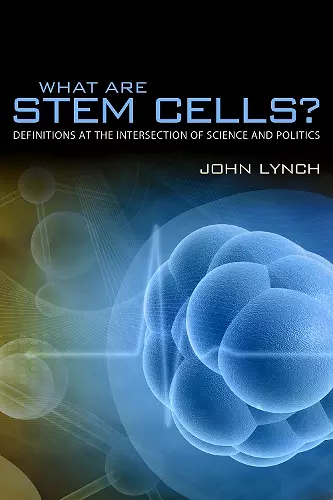What Are Stem Cells?
Definitions at the Intersection of Science and Politics
Format:Hardback
Publisher:The University of Alabama Press
Published:30th Sep '11
Should be back in stock very soon

In recent years political, religious, and scientific communities have engaged in an ethical debate regarding the development of and research on embryonic stem cells. Does the manipulation of embryonic stem cells destroy human life? Or do limitations imposed on stem cell research harm patients who might otherwise benefit?
John Lynch’s What Are Stem Cells? identifies the moral stalemate between the rights of the embryo and the rights of the patient and uses it as the framework for a larger discussion about the role of definitions as a key rhetorical strategy in the debate. In the case of stem cells, the controversy arises from the manner in which stem cells are defined--in particular, whether they are defined with an appeal to their original source or to their future application. Definitions such as these, Lynch argues, are far more than convenient expository references; they determine the realities of any given social discourse.
Lynch addresses definitions conceptually--their stability in the face of continual technological innovation, their versatility at the crossroads of scientific and public forums, and their translations and retranslations through politics. Most importantly, his work recognizes definitions as central to issues, not only within the topic of stem cell research, but also in all argumentation.
"Although bioethical issues surrounding stem cell research during the Bush and Obama administrations form a backdrop, Lynch (communication, Univ. of Cincinnati) is more concerned here with how language is used than with ethical positions. He presents definitions not so much as reflections of reality, but more as malleable tools for shaping public debate and policy. He introduces the idea of "scientistic idioms" to describe how various proponents and opponents of stem cell research incorporate the language of science to bolster their positions. Ironically, critics of stem cell research often use scientific idioms to challenge and undermine the authority of stem cell researchers. Lynch also frames his analysis in terms of a 'Manichean idiom' that presents stem cell research in terms of struggles between good and evil. For proponents of stem cell research, the Manichean idiom may take the form of scientific progress versus benighted religious or political agendas. Opponents may use the same idiom to contrast overreaching science with protection of human values. Lynch's analysis is useful for understanding not only debates over stem cell research, but also contentious issues such as teaching evolution in schools--a topic briefly addressed in the conclusion. Part of the 'Rhetoric, Culture, and Social Critique' series. Summing Up: Recommended. Upper-division undergraduates through professionals." —CHOICE
ISBN: 9780817317485
Dimensions: 228mm x 154mm x 22mm
Weight: 447g
192 pages